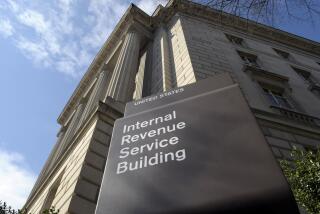U.S. Treasury to Retire More Debt in Quarter
WASHINGTON â The U.S. Treasury estimated Monday that it will retire more of its debt in the quarter than previously forecast, and projected a record payoff during the April-June quarter as the economy generates strong revenue.
The Treasury said it will make a net payoff of $17 billion in debt in financial markets during the current quarter, assuming a March 31 cash balance of $40 billion.
That compares with net borrowing of $47 billion during the October-December quarter, with an ending cash balance of $83.3 billion.
In the April-June quarter, the Treasury estimates it will retire a record $152 billion and report a cash balance of $40 billion on June 30. Income taxes are due in April, which swells the Treasuryâs coffers.
âWith this boom, the money just keeps rolling in and Washington prospers,â said Robert Dederick, an economic consultant at Northern Trust Co. in Chicago.
The projected April-June debt retirement would top the previous record of about $114 billion, set during the 1999 April-June quarter.
Mondayâs announcement served as a prelude to Wednesdayâs quarterly financing news conference, at which the Treasury will disclose plans for next weekâs sale of five-year notes, 10-year notes and 30-year bonds. Those securities will make up a major portion of borrowing for the quarter--essentially, rolling over a portion of maturing notes and bonds.
For fiscal 2000 and 2001, the Congressional Budget Office forecasts federal surpluses of $176 billion and $235 billion. Last week, President Clinton said he will offer a plan that would let the U.S. pay off its publicly held debt by 2013, two years ahead of schedule.
Annual surpluses donât mean the government owes less, technically. Government debt totaled $5.66 trillion at the end of fiscal 1999, up from $5.53 trillion at the end of fiscal 1998, mainly because excess Social Security payroll tax collections are invested in non-marketable Treasury securities.
Social Security lends its surplus to finance day-to-day government activities by buying those securities, which increases the overall debt, but that basically amounts to the nation borrowing from itself.
More to Read
Inside the business of entertainment
The Wide Shot brings you news, analysis and insights on everything from streaming wars to production â and what it all means for the future.
You may occasionally receive promotional content from the Los Angeles Times.










